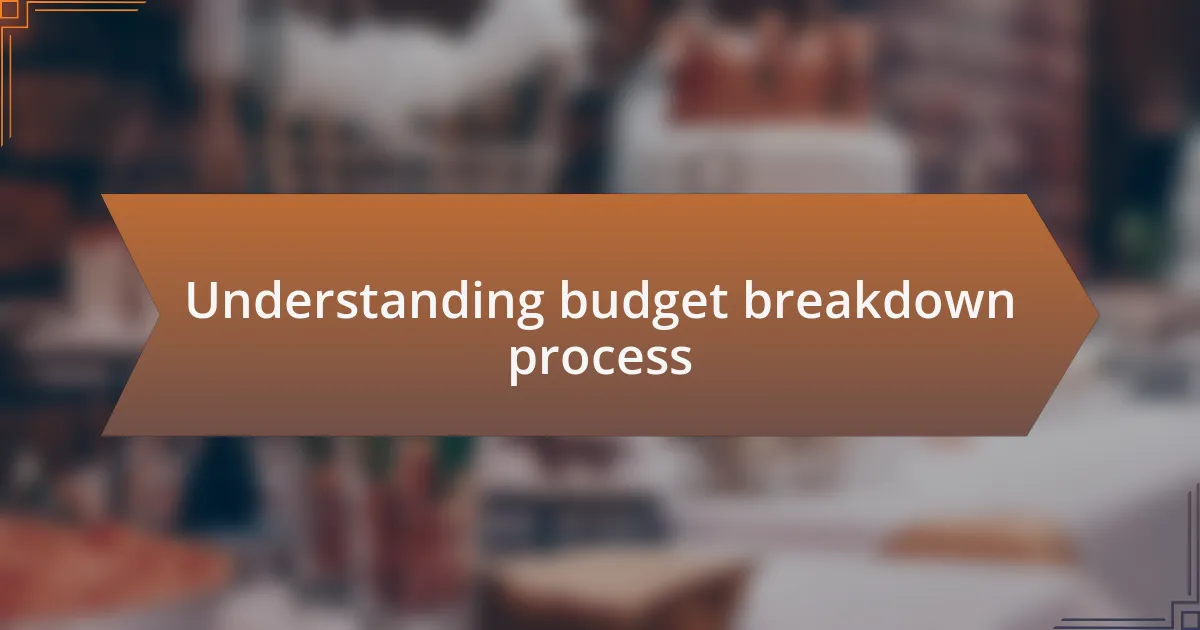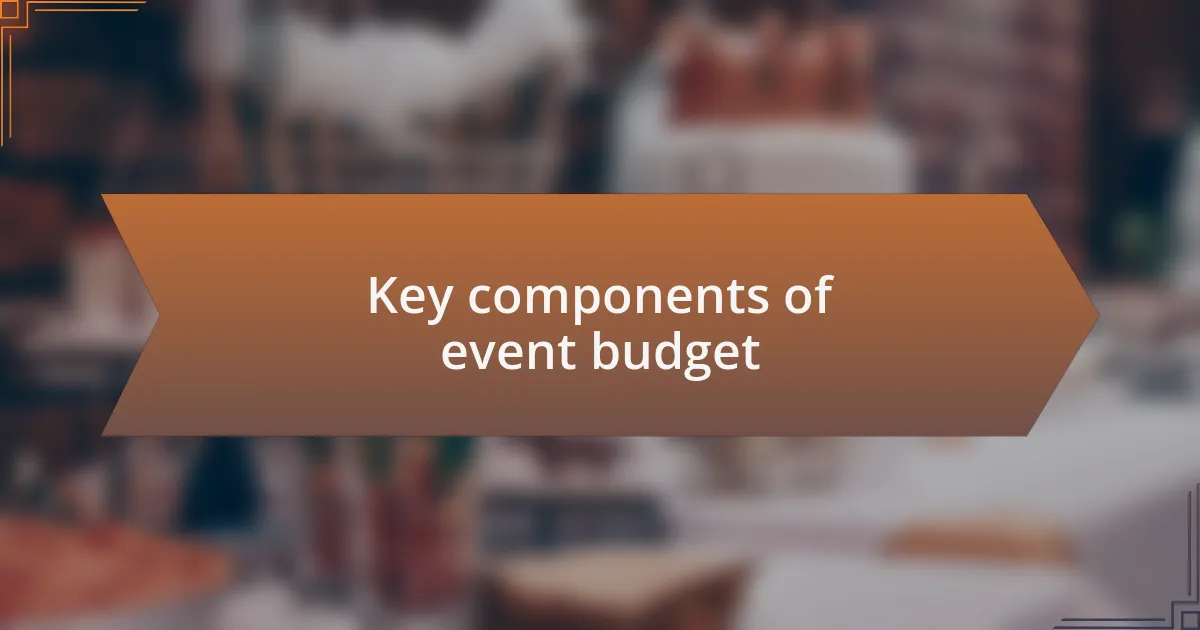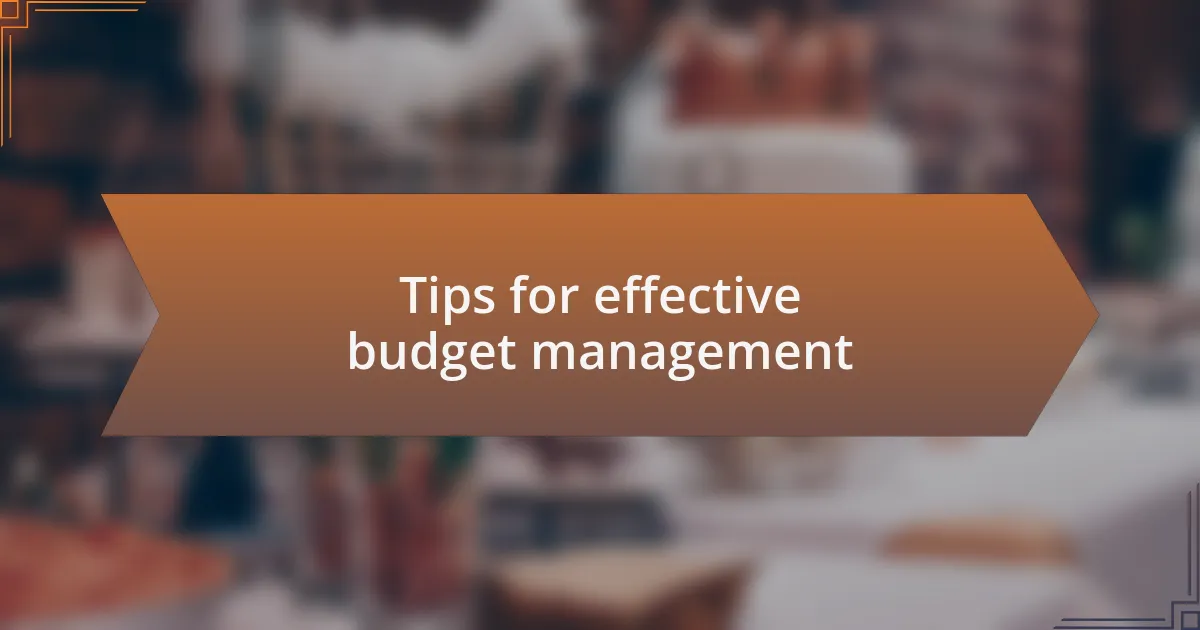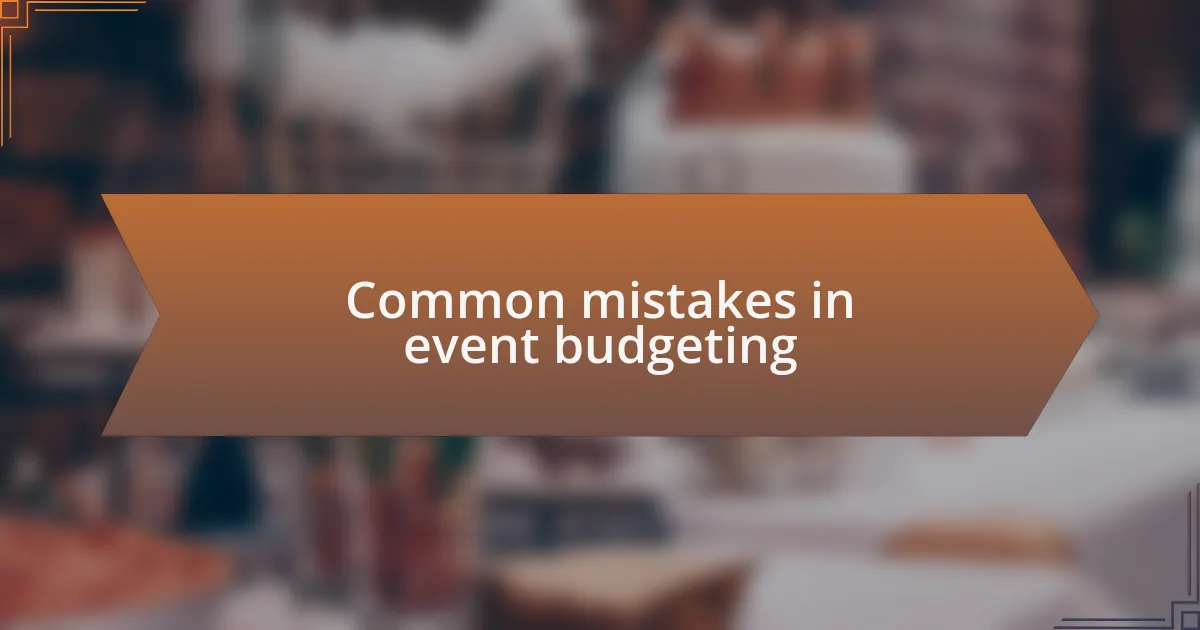Key takeaways:
- Prioritize key expenses to allocate resources effectively and reassess the budget regularly for unexpected costs.
- Include a contingency fund (at least 10% of the budget) to handle unforeseen expenses smoothly.
- Track all expenses meticulously and review budgets weekly to stay accountable and make necessary adjustments.
- Avoid common mistakes like underestimating costs and neglecting post-event expenses to ensure a comprehensive budget.

Understanding budget breakdown process
Understanding the budget breakdown process requires a clear view of your event’s needs. I remember sitting down for the first time with a blank spreadsheet, overwhelmed by the number of categories I needed to fill in. How do you start to allocate funds to something so multifaceted?
As I delved into specifics like venue costs, catering, and marketing, I found it helpful to prioritize. I started listing my top three must-haves for the event. This practice allowed me to allocate resources where they truly mattered, which made me feel more in control amidst the chaos of planning.
It’s also crucial to reassess your budget regularly as the planning unfolds. There were moments when unexpected expenses crept in, and I had to make tough choices. Have you ever had to pull back on one area to boost another? I learned that flexibility in your budget breakdown process can often lead to creative solutions, transforming challenges into opportunities for innovation.

Key components of event budget
When creating an event budget, the primary components typically involve venue, catering, and equipment rental. I once spent hours researching venues, only to find out that the location had additional costs like setup and cleaning fees. It’s a reminder that even seemingly straightforward choices can have hidden expenses. Have you ever looked at a price tag and thought it was a steal, only to realize later that there was more to consider?
Another critical aspect is marketing and promotion. I vividly remember launching a social media campaign for an event that ended up eating into my budget significantly. The key takeaway was that you can never overlook the importance of attracting your audience. How much are you willing to invest in reaching your target attendees? Your advertising budget could very well determine the success of your event.
Don’t forget about unforeseen expenses, which I’ve learned the hard way. I once planned meticulously only to face unexpected travel costs for a keynote speaker. This experience taught me the value of including a contingency fund in my budget. It may feel uncomfortable to set aside those extra dollars, but trust me, it can save you from stress in the long run. How do you prepare for the unexpected when planning an event?

Sample event budget structure
When structuring an event budget, it’s essential to categorize expenses methodically. Based on my experience, I prefer breaking down costs into fixed and variable categories. Fixed costs—like venue rental—tend to be predictable, but it’s the variable expenses, such as catering, where I often find room for surprises. Have you ever underestimated how much food and drink can eat into a budget?
I also recommend creating a section for each event element, detailing specific costs. For instance, I once managed an event where my audio-visual setup costs ballooned because I hadn’t accounted for necessary technological upgrades. This experience taught me to be detailed in my budgeting process, listing everything from lighting to sound checks. It all adds up faster than you think!
Finally, I find it helpful to include a section for operational costs, such as staff and logistics. I remember a situation when I had to scramble at the last minute for additional staff due to last-minute RSVPs. It led to some costly overtime fees that I hadn’t planned. It made me realize that accurately forecasting attendance is crucial. How do you ensure your budget reflects the dynamic nature of event planning?

Personal budget breakdown for events
When I create a personal budget for events, I begin with a clear vision of what I want to achieve. I remember budgeting for my sister’s wedding, where I neatly outlined everything from flowers to the cake. Though I aimed for elegance, I felt the pinch when I underestimated the floral arrangements. It serves as a vivid reminder that pretty things can come at a premium.
One strategy that has saved me countless headaches is assigning a specific percentage of the overall budget to each category. For instance, I allocate around 20% for decor, which includes centerpieces and lighting. One time, I miscalculated and ended up compromising on essential decor elements I truly wanted. It dawned on me how small adjustments in one area could ripple across the entire budget, impacting the overall aesthetic. Have you ever had to choose between two items because of a budget oversight?
Lastly, I always leave room for contingencies—at least 10% of the total budget. This buffer helped me deal with unexpected costs during my last corporate retreat, where venue fees unexpectedly increased. The relief I felt having that cushion was immense. Without that buffer, I would have been scrambling to fix things at the last moment. Budgeting is an art of both foresight and flexibility, wouldn’t you agree?

Tips for effective budget management
One effective tip for managing a budget is to track all expenses meticulously. During my first major event, I used a simple spreadsheet to log every single cost. I was startled to discover how quickly small items, like stationery and refreshments, added up. Have you ever thought you spent less than you did, only to find there was a hidden financial leak? It’s essential to keep an eye on those little details because they can easily derail your budget.
Regularly reviewing your budget is another game-changer. I established a routine where I’d sit down every week to compare my actual spending against my initial plan. This practice not only keeps me accountable but also allows for necessary adjustments. Have you ever felt the pressure of keeping everything on track? It can be overwhelming, but I’ve found that a quick weekly check-in can alleviate that stress significantly by ensuring everything aligns with my goals.
Lastly, prioritize your spending by identifying what truly matters for the event. I learned this lesson the hard way when I splurged on fancy invitations only to realize later that my sound equipment needed an upgrade. It made me rethink my priorities for future events. Are you investing in areas that will leave a lasting impression? Focus on what enhances the experience and cut back in areas that won’t be noticed as much. This insight transformed how I approach my budgets and ultimately led to more memorable events.

Common mistakes in event budgeting
When budgeting for an event, one common mistake is underestimating costs. I remember planning a corporate retreat and thinking I had everything nailed down, only to be blindsided by additional fees, like venue overtime and last-minute catering changes. Have you ever faced unexpected expenses that turned your well-structured budget into chaos? It’s a harsh lesson, but always padding your budget for unforeseen costs can save you from major headaches down the line.
Another frequent error is failing to consider the full lifecycle of the event. In one of my earlier experiences, I focused solely on the day-of expenses and neglected post-event costs, like thank-you gifts for speakers and final invoices. I found myself scrambling to pay those bills after the event when cash was tighter than anticipated. Have you thought about what happens once the event is over? Including these expenses in your budget from the beginning ensures a smoother financial process.
Lastly, relying too heavily on estimates rather than actual quotes can lead to financial pitfalls. I once based my budget on a vendor’s rough estimate, only to find the final price significantly higher. That misstep taught me the importance of gathering detailed quotes and comparing options before committing. What can you do to avoid similar situations? Always request formal proposals and keep a close eye on changes to vendor contracts, as this diligence can drastically impact your overall financial picture.